BUDAKA: The ministry of Trade, Industry, and Cooperatives has embarked on a program to revive the collapsing North Bukedi Cooperative Union [NBCU] by actively reviving all the dead primary societies which were formerly associated with the Union.
The Union Chairperson, Farouk Gundi said that during the meeting held on Oct 10, the registrar of cooperatives, Mr. Joseph William Kitandwe, resolved that the Union should revive all the silent primary societies, numbering about 75 in total.
“The roadmap has been drawn for the revival of all primary societies and a committee will be elected to see the plan through,” Gundi said, adding that once elected, the committee will have a representative from each primary society affiliated to the Union.
According to the roadmap a copy of which theCooperator has seen, the exercise will start on Oct 14 in Pallisa County, followed by Butebo, Budaka and Kibuku. “All the concerned parties have been informed about the pending elections. The exercise will be overseen by the cooperative officers from the ministry, commercial officers of the respective districts, and Union representatives,” Gundi said.
Through a circular from the registrar of cooperatives, all the stakeholders especially the former leadership committees of these (primary)societies have been asked to mobilize their members to attend these meetings dubbed special general meetings, in which new committee members will be elected.
North Bukedi Cooperative Union [NBCU] is one of the oldest traditional Cooperative Unions in Uganda. Others are Bugisu Cooperative Union, Masaba Cooperative Union, and Banyankole Kweterana Cooperative Union.
Prior to the late 80s, the Unions were providing employment to hundreds of farmers, offering scholarships to students, and engaging in other social support and development activities. But the proceeding political instability in the country saw the Union lose many of its assets, along with the decline of cotton production which was the mainstay of Bukedi sub-region.
In April, theCooperator reported how the Union was also choking on debt, following shs.500 million it borrowed from Housing Finance Bank in 2003 to construct the Union premises in Mbale but consequently failed to pay back.
But Gundi says the Union is now getting back on its feet. He said that the government had released Shs.1.2bn as part of the Union’s compensation for the damages suffered during the NRA bush-war, which it (the Union) had used to clear some of its outstanding debts.
“All the Union’s debts have now been cleared to zero,” says Gundi.
Cotton struggles hurt the Union
To date, Cotton production remains the leading economic activity in Bukedi, and fluctuations in its price inevitably affect the Union’s fortunes.
Gundi told theCooperator that as a result of persistent fall in the price of cotton, most farmers in the cotton-growing districts of greater Bukedi had lost the morale of cultivating the crop, rendering the ginneries redundant at a time when the union had acquired loans to offer incentives like purchase of pesticides, spray pumps to shore up production. He pointed out that ginneries had closed in Ladoto, Bulangira, Kibuku and Kakoro areas, all of which were affiliated to NBCU.
“NBSCU would have cleared its loan in time, were it not for the steep fall in cotton prices,” Gundi says.
But Mr. Arthur Wako Mboizi, a seasoned farmer and politician in the area told theCooperator that beyond the fall in the price of cotton, NBCU could have been a victim of maladministration.
“What has killed the Union is poor management,” he said, adding “To add salt to an injury, the managers (of the Union) went ahead to sell off the Union’s only viable and vibrant Iki-Iki ginnery, remaining with dormant ones.”
Speaking during the meeting, the state minister for cooperatives, Mr. Fred Ngobi Gume, said that the government believes in the philosophy of organizing through cooperatives and that it would systematically support the recovery of all cooperatives with recognizable memberships and influence.
